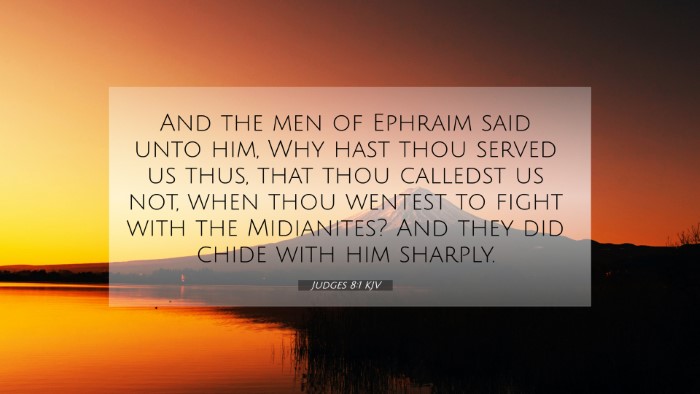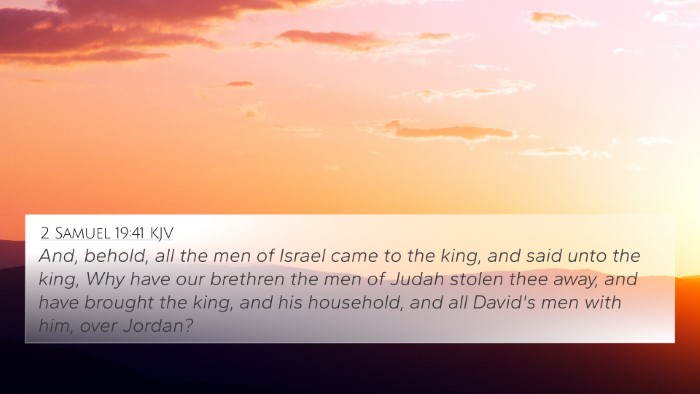Understanding Judges 8:1
Judges 8:1 states, "And the men of Ephraim said unto him, Why hast thou served us thus, that thou calledest us not, when thou wentest to fight with the Midianites? And they did chide with him sharply." This verse presents a critical moment in the narrative of Gideon and reveals themes of leadership, tribal dynamics, and conflict resolution.
Meaning and Interpretation
The ensuing dialogue in this verse showcases the reactions of the Ephraimites to Gideon's military success and their feelings of exclusion from the battle. Their complaints reflect a broader theme of communal identity and the importance of recognition in leadership.
Insights from Public Domain Commentaries
-
Matthew Henry's Commentary:
Henry emphasizes the jealousy of the Ephraimites and their pride, which leads them to confront Gideon. He points out that they were not involved in the initial call to arms and thus felt marginalized. This highlights the common human tendency to seek validation and recognition, particularly after the success of others.
-
Albert Barnes' Notes:
Barnes notes that the anger of Ephraim was not just about being overlooked, but also tied to their desire for influence and honor in the outcome of the victory. He suggests that this incident teaches the importance of effective communication among leaders and their followers to maintain unity.
-
Adam Clarke's Commentary:
Clarke provides a detailed background, indicating that the Ephraimites had a historical hunger for acknowledgment and that their critique of Gideon was rooted in past grievances. He interprets their confrontational attitude as a sign of discontent that can arise within groups, particularly in the context of shared goals.
Thematic Bible Verse Connections
This verse can be cross-referenced with several other passages to broaden the understanding of its themes:
- Exodus 12:37-38: The need for inclusion and unity among the Israelites as they left Egypt.
- Joshua 22:10-34: The importance of communication in avoiding misunderstandings between tribes.
- 1 Samuel 10:27: The discontent and criticism faced by leaders like Saul due to public perceptions.
- Matthew 20:26-28: The idea that true leadership involves servitude rather than dominance or mere recognition.
- Romans 12:3-5: The concept of humility and collective identity within the body of Christ.
- Acts 6:1-7: Early church management of conflict and the importance of addressing grievances among believers.
- Philippians 2:1-4: The call to unity and putting others before oneself.
Practical Applications
Understanding the dynamics seen in Judges 8:1 can be important for modern readers:
- Recognizing the need for clear communication among groups can prevent conflicts.
- Valuing each member's contributions fosters unity and reduces jealousy.
- It can serve as a meditation on humility in leadership roles, urging leaders to acknowledge and uplift their followers.
Conclusion
Judges 8:1 illustrates a moment of tension that serves as a reminder of the complexities of leadership and community relations. By examining this verse through the lens of public commentaries and cross-references, readers gain insight into the spiritual and practical implications of the text. Reflecting on the themes addressed can deepens one’s understanding of communal interactions as seen throughout the Bible.







